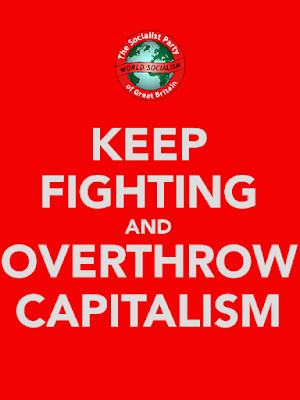Our concern is with substituting the common social ownership of the means of life for the present system of class ownership. Our aim is to abolish the exploitation of man by man. There can be no peaceful gradual transformation of capitalism into socialism, as preached by the reformists, because of the opposite natures of the very foundations of capitalist and socialist society and of the antagonistic interests of labour and capital. Members of the Socialist Party are all agreed as to the general object for which they are striving – the ownership of all the means of production by the community; that community to be organised on the most democratic basis possible. The point of difference here between socialists and anarchists is not on the form of organisation of the future society, or of the details of such organisation. It is not that the Socialist Party wish to impose on the future society a huge bureaucratic system, spreading its octopus-like tentacles across all social life, crushing all individuality, and reducing every detail of existence to rule and plan. The difference is the strategy of achieving our ends. The Socialist Party says the struggle to secure the social ownership of the means of production should be accomplished by first the capture of the state machine and then its coercive function withering out.
The first condition of success for socialism is that its adherents should explain its aim and its essential characteristics clearly, so that they can be understood by every one. We must do away with many misunderstandings circulated by our opponents. The main idea of socialism is simple.
The Socialist Party believe that society is divided into two great classes by the present form of property-holding, and that one of these classes, the wage-earning, the proletariat, is obliged to hire themselves out to the owners of the means of production and distribution. The multitude of people possess nothing. They can only live by their work, and since, in order to work, they need access to expensive equipment, which they have not got, and raw materials, which they have not got, they are forced to put themselves in the hands of another class that owns the means of production, the land, the factories, the machines, and the raw material. And naturally, the capitalist and possessing class, taking advantage of its power, makes the working people, the non-owning class, pay a large forfeit. It does not rest content after it has been reimbursed for the advances it has made and has repaired the wear and tear on the machinery. Classes and class rule and their attendant progress and poverty, misery, turmoil and strife, are inherent in the capitalist system.
Why? Simply because one set of men owns the technology with which wealth is produced, while another set uses them, and there is an irrepressible conflict over the division of the product. By virtue of the individual ownership of the social instruments of production, one capitalist may exploit the labour of a million working people and become a billionaire, while millions of workers struggle through life in penury and want, towards a bleak and barren old age, to find rest at last in a care-home and eventually, the undertakers.
This rich and resourceful world should be free from the scourge of poverty but it never will be until the private ownership of the means of sustaining life is abolished and society is organised on the basis of common ownership. It is for this great change, this worldwide social revolution, that the socialists of all countries are organising.It is not to reform the evils of the day, but to abolish the social system that produces them, that the Socialist Party is organised. It is the party, not of reform, but of revolution, knowing that the capitalist system has had its day and that a new social order, based upon a new system of industrial democracy. The working class are beginning to spell solidarity and to pronounce socialism. They are yearning for emancipation from wage-slavery and they are crusading against the ignorance and the prejudices of their fellow workers people. Common ownership is the revolutionary demand of the World Socialist Movement. Its promotion is one of education and is perfectly orderly and peaceable. The workers must be taught to unite and vote together as a class in support of the Socialist Party, the party that represents them as a class. Private ownership will give way to collective ownership, and production for profit to production for use; the wage system will disappear, and with it the poverty, misery and crime that wage-slavery breeds. A new era will dawn on human progress and the civilisation of humanity.





